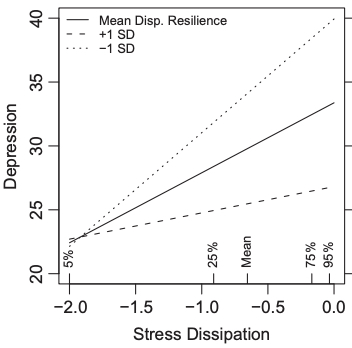Daily data from the NDHWB (n = 783; age range 37–90) were analyzed to produce ‘dynamic characteristic’ estimates of stress input and dissipation. These were used in multi-level modeling (with age and trait stress resistance) to predict depression and health trajectories.
Abstract
Daily data from the NDHWB (n = 783; age range 37–90) were analyzed to produce ‘dynamic characteristic’ estimates of stress input and dissipation. These were used in multi-level modeling (with age and trait stress resistance) to predict depression and health trajectories. Main effects suggest that dissipation and stress resistance predict lower depression and better health, but lower stress input was only related to lower depression. Interactions revealed that subjects with above average stress resistance had lower depression irrespective of their ability to dissipate stress, but for individuals low in trait resistance those with better stress dissipation show lower depression and better health.
Citation
Bergeman, C. S. & Deboeck, P. R. (2014). Trait stress resistance and dynamic stress dissipation on health and well-being: The reservoir model. Research in Human Development, 11(2), 108–125.
